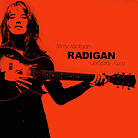May 2000
Radigan’s point is that her record emphasizes the performance as whole, not just the songs or the singer. She takes what could have been a standard-issue collection of country pop and adds lots of atmosphere. This is dangerous territory, because in less-talented hands, atmosphere can turn into sludge. But the arrangements are sufficiently evocative and tasteful to keep the songs from collapsing of their own weight. For example, on "The Things You’ll Do," a "why do I put up with him" lament, Radigan and co-producers Justin Niebank and Kenny Greenberg lay on a string quartet and synths and end up with a airy, noirish feel, evoking a smoky, dimly lit lounge, truly late-evening listening. "Everything Starts Out Small" is a more up-tempo piece that has a Middle Eastern melody smoldering underneath the strings, real and artificial. "So What" is a Philadelphia soul workout (remember the strings on those '70s O’Jays hits? They live on here.). "Happiness" is more ethereal, late-night, blue-lounge work. "50 Kisses," the closing track, is built around a tango rhythm. This is pretty different from what typically emerges from Nashville. But traditionalists need not fear completely. All of the album’s songs are built around a core of guitars, bass, and drums (although the latter two are synthesized sometimes), and the occasional banjo or mandolin makes an appearance. Some of the arrangements are straight country pop too. "When I Get Around You" is a primary example, as is "Blink" (with the exception of the Middle Eastern break, creating a sound like Shania Twain meets Led Zeppelin’s "Kashmir"). The production is particularly important, because the songs themselves are pretty much pedestrian three-chord workouts on the trials and tribulations of love and relationships. "I’ve played it over in my head/Thought about the words you said/Laid awake in my bed/It’s gone, gone, gone," Radigan sings on "Love Wouldn’t Lie To Me," not exactly an original sentiment. Neither is "No I can’t get through/Not another day/Where I turn to you/And you turn away" from "G-O-O-D-B-Y-E" (hey, when’s the last time a Nashville singer spelled out the title of the song?). Radigan has a well-trained voice, smooth but not compelling. Still, it’s perfectly suited for the arrangements, staying on top of, but not overwhelming, everything else that’s going on around her. There are only so many ways for a modern female singer-songwriter to say love stinks. By emphasizing sound and feel over clever words or angry delivery, Terry Radigan creates her own niche. Anything with a fresh take on a genre that’s becoming as old as the hills deserves a listen. GO BACK TO: |
 Terry Radigan -
Radigan
Terry Radigan -
Radigan![[Reviewed on CD]](../format/regcd.gif) If the
artist is based in Nashville and has written songs for the likes of Trisha Yearwood and
Patty Loveless, the record must be country, right? Well, sort of. Terry Radigan says of
her latest offering, Radigan (OK, apparently not much thought went into the title),
"I didn’t want to make a singer-songwritery kind of record." In a certain
respect, she did not succeed; it’s the Terry Show from beginning to end. But Radigan
is, in fact, atypical of its supposed genre, and consequently makes for interesting
listening.
If the
artist is based in Nashville and has written songs for the likes of Trisha Yearwood and
Patty Loveless, the record must be country, right? Well, sort of. Terry Radigan says of
her latest offering, Radigan (OK, apparently not much thought went into the title),
"I didn’t want to make a singer-songwritery kind of record." In a certain
respect, she did not succeed; it’s the Terry Show from beginning to end. But Radigan
is, in fact, atypical of its supposed genre, and consequently makes for interesting
listening.